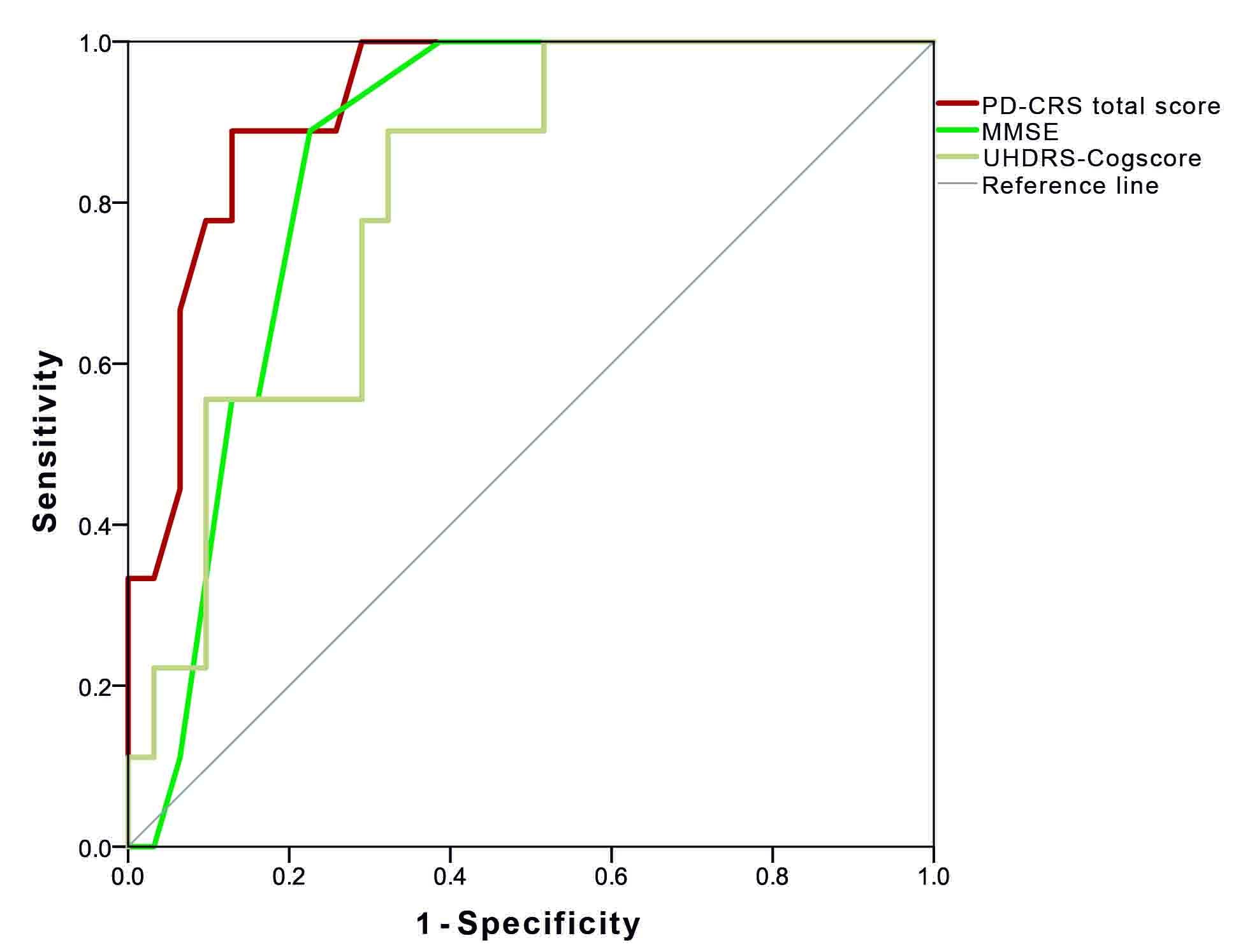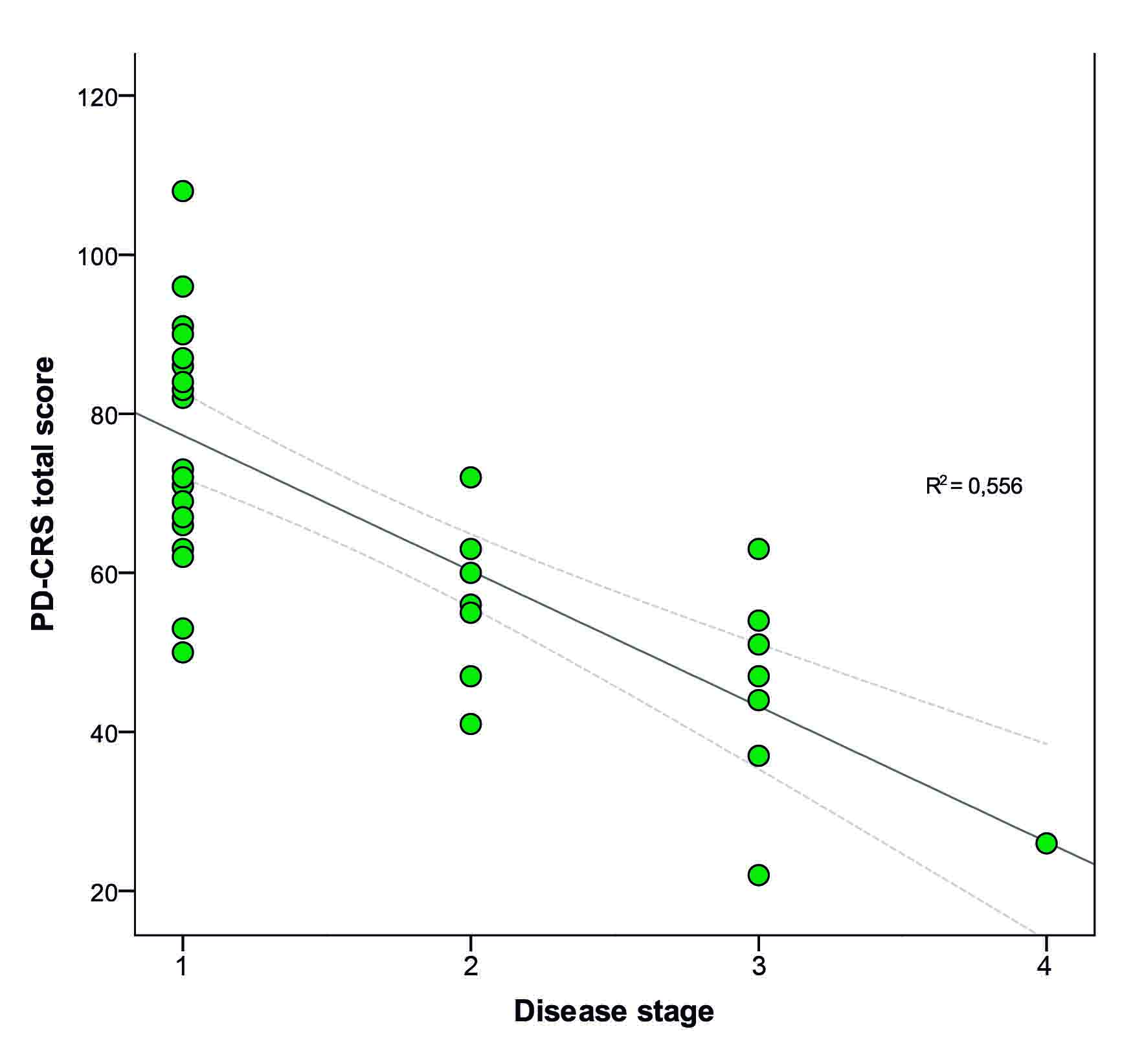Session Information
Date: Tuesday, June 6, 2017
Session Title: Huntington's Disease
Session Time: 1:45pm-3:15pm
Location: Exhibit Hall C
Objective: To explore the psychometric properties of the PD-CRS as compared to two commonly used measures (the MMSE and the UHDRS Cognitive score) for detecting cognitive impairment in HD and discriminating cognitive profiles and disease-stage.
Background: Cognitive impairment is an essential feature of Huntington’s disease (HD) and causes an enormous impact on quality of life. In the context of HD, comprehensive assessment batteries are time consuming and impractical as outcome measure in clinical trials, and short assessment scales for global cognition have generally shown limited specificity over the cognitive characteristics of HD. The PD-CRS, an instrument specifically designed to capture disexecutive and posterior cortical deficits in PD, might also prove valid, reliable and practical in HD.
Methods: Forty-one symptomatic gene-mutation carriers ranging on disease-stage between 1 and 4 were enrolled. The Clinical Dementia Rating scale (CDR) sum-of-boxes was used as gold-standard and to classify participants as cognitively preserved (CDR = 0), MCI (CDR = 0.5) or demented (CDR > 0.5).
Results: With a sensitivity 90% / specificity 81%, the PD-CRS cutoff ≤ 81 showed the highest discriminative power (AUC=0.896; 95% CI 0.78 – 1) detecting cognitive impairment. The MMSE ≤ 26 showed a sensitivity of 88% / specificity 68% (AUC=0.793; 95% CI 0.63 – 0.94) and the UHDRS-Cogscore ≤ 180 a sensitivity 77% / specificity 63% (AUC=0.753; 95% CI 0.57 – 0.93). The PD-CRS cutoff ≤ 55 differentiated dementia from MCI with a sensitivity 87% / specificity 85%, the MMSE ≤ 24 with sensitivity 74% / specificity 50%. The UHDRS-Cogscore was not computable due to extreme floor effects in demented patients. All instruments captured significant differences between stages 1 – 2 and 1 – 3. The PD-CRS showed the strongest correlation adjusted for age/education with disease-stage (r=-0.709; p<0.000).
Conclusions: The PD-CRS appears as an appropriate instrument to assess cognitive impairment in HD based on its excellent psychometric properties and superiority compared to other common tools. Further studies will explore sensitivity to change over time, discriminative properties in premanifest HD population and, whether the addition of more HD-specific sub-tests can improve the psychometric properties of the present version of the scale.
References: 1. Pagonabarraga J, Kulisevsky J, Llebaria G, García-Sánchez C, Pascual-Sedano B, Gironell A. (2008) Parkinson’s disease-cognitive rating scale: a new cognitive scale specific for Parkinson’s disease. Mov Disord. May 15;23(7):998-1005. doi: 10.1002/mds.22007.
2. Fernández de Bobadilla R, Pagonabarraga J, Martínez-Horta S, Pascual-Sedano B, Campolongo A, Kulisevsky J. (2013) Parkinson’s disease-cognitive rating scale: psychometrics for mild cognitive impairment. Mov Disord. Sep;28(10):1376-83. doi: 10.1002/mds.25568.
To cite this abstract in AMA style:
S. Martinez-Horta, A. Horta-Barba, J. Perez-Perez, J. Pagonabarraga, J. Marin-Lahoz, J. Kulisevsky. Screening of cognitive impairment in Huntington’s disease with the Parkinson’s Disease – Cognitive Rating Scale (PD-CRS) [abstract]. Mov Disord. 2017; 32 (suppl 2). https://www.mdsabstracts.org/abstract/screening-of-cognitive-impairment-in-huntingtons-disease-with-the-parkinsons-disease-cognitive-rating-scale-pd-crs/. Accessed December 24, 2025.« Back to 2017 International Congress
MDS Abstracts - https://www.mdsabstracts.org/abstract/screening-of-cognitive-impairment-in-huntingtons-disease-with-the-parkinsons-disease-cognitive-rating-scale-pd-crs/


